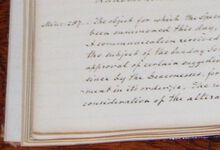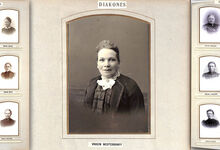Ministry (36): Last stop—a final decision
As it studied the Bible to find the answers to its questions, the New Apostolic Church followed a clearly formulated roadmap. What answers resulted at each stop, and what still needed to be done at the last stop? An overview of the decision-making process pertaining to the question of women in ministry.

Who can bear a spiritual ministry? Well, naturally, the Bible will provide the answers. Only one problem: you can find all sorts of statements there, including their exact opposites. Therefore it is impossible for a church to base its teaching on individual Bible verses when it comes to this question.
So it was that the line of inquiry adhered to the following guideline: “The Bible does not prescribe what decisions we should make, but it does tell us how we are to make them, namely by respecting the will of God.” And that was exactly what the first point in the line of questioning was all about.
“Is it the will of God that women should not be ordained?”—The result of the Bible analysis: No. Quite the contrary. After all, the account of the creation reveals the will of God. Accordingly, man and woman are both equally created in the image of God, are thus both of the same dignity, and have both been assigned the same duty in the creation.
The first and second accounts of creation do differ in certain nuances, however. While one verse of the proto-history does regard the man to be master over the woman, this is not a commandment of God. Rather it describes the consequences of the fall into sin—and thus does not represent the will of the Creator.
“Does the fact that Jesus only called men to the Apostle ministry automatically mean that women cannot be ordained?”—Here too, the answer is “no”. After all, the biblical context makes it clear that Jesus was not concerned with gender roles. He called the twelve men as a parallel to the twelve patriarchs of Israel. In so doing, He signalled that He was the one who had established the promised new people of God.
Jesus Christ’s own view of the role of women was far ahead of its time. They were His students, disciples, heralds, and messengers, not to mention key witnesses to His resurrection. And here the following observation is also true: “As far as the gospels relate, Jesus never expressed that women would be unsuited to serve as Apostles or any other minister in the church.”
Taking Jesus' actions as the sole standard here would also preclude the ordination of non-Jews, because Christ only called Jews. Beyond that, He only called His companions (that is, those who had physically walked with Him). So by that measure, not even Paul could have been considered an Apostle.
“Are there any statements in the apostolic letters of the New Testament that would make it impossible to ordain women?”—The answer is a third “no”. While 1 Corinthians and 1 Timothy do contain verses that command women to be silent, their content contradicts other passages in 1 Corinthians and Romans. By contrast, the letters of Paul and the book of Acts even contain accounts that testify of the role that women actually played in the churches.
So it was that the biblical study came to the following final result: “Individual negative statements found in some New Testament letters concerning the active participation of women in divine service and the congregation do not constitute sufficient grounds for excluding women from ministry. Thus it is the responsibility of the apostolate—which has magisterial authority and the mandate to regulate church order—to make a decision.”
In advance of the decision
This magisterial authority and the mandate to regulate church order is biblically based: according to Matthew 18: 18 Jesus conferred upon the Apostles the authority to bind and to loose, that is, to declare something to be binding or non-binding. And according to 1 Corinthians 4: 1, the Apostles are “stewards of the mysteries of God”, whose task it is to reveal new insights. The early Apostles already made use of this authority and mandate when they called helpers to the poor (Deacons) and when they introduced the first major doctrinal change, namely that non-Jews could also become Christians.
This still leaves us with a look into our own past: for half of its history, the New Apostolic Church only ordained men. Before that, however, women were also active as Deaconesses. This tradition was inherited from the Catholic Apostolic Church, practically leading women to the sacrament at the altar, then disappeared again for unexplained reasons.
This much is clear: up until now, there had been no doctrinally justified decision on the part of the apostolate, whether for the calling of Deaconesses or the later decision to ordain only men. Either way, there was still some groundwork to be done here. The next issue of this series will explore how that turned out.
Article info
Author:
Date:
Andreas Rother
03.10.2023






















